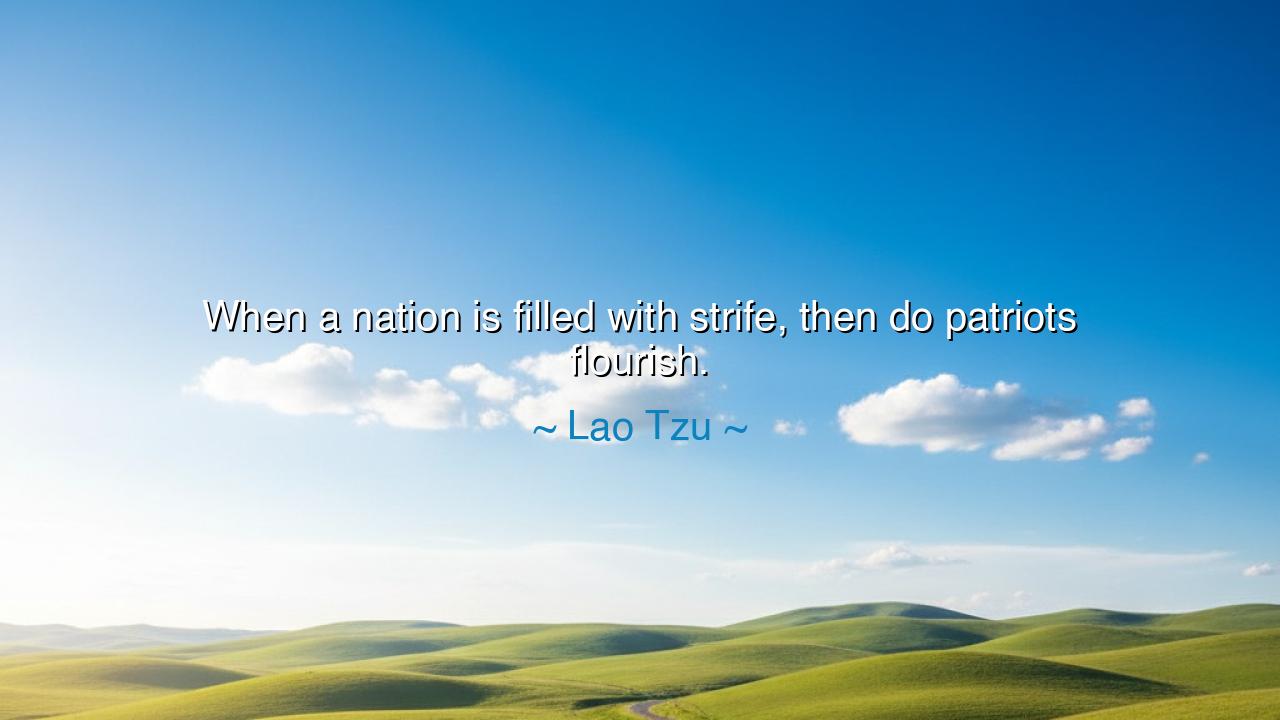
When a nation is filled with strife, then do patriots flourish.






“When a nation is filled with strife, then do patriots flourish.” Thus spoke Lao Tzu, the sage of ancient China, whose words endure like a river flowing through centuries. In this saying he reveals a paradox both sorrowful and noble: that patriots often arise not in times of peace and comfort, but in seasons of division, chaos, and suffering. For when the land is tranquil, devotion slumbers quietly; but when storms descend and the nation trembles, the hearts of the faithful blaze like torches, and the true lovers of country step forth.
The meaning of this saying is profound. Strife, though destructive, summons forth courage. A divided people calls forth healers and defenders. A land at war or in turmoil awakens the souls of those who might otherwise remain hidden in obscurity. The patriot is not always a man of public honor; he may be the farmer, the scholar, the soldier, the mother, who rises in the hour of trial to protect the fragile fabric of the homeland. Thus, strife is both a curse and a furnace, for though it wounds a nation, it also refines its people and reveals the purest hearts among them.
The origin of such wisdom lies deep in Lao Tzu’s vision of the Tao. He saw that life moves in cycles: peace gives way to conflict, conflict to renewal, renewal back to peace. In each cycle, balance is restored by those who act with harmony to resist destruction. In the same way, patriots “flourish” during strife because the storm calls them into being. Like seeds buried in the earth, they lie unseen until the rains of trial awaken them to sprout and grow.
History provides countless examples. Consider the American Revolution: before tyranny’s pressure grew unbearable, most colonists lived quietly, content with daily toil. But when strife engulfed their land, when injustice pressed upon them, patriots like Washington, Jefferson, and Franklin emerged, voices that shaped a new destiny. Their greatness did not exist in ease—it was born of strife, and through it they flourished, becoming the architects of liberty.
Or recall World War II, when nations reeled under the shadow of fascism. Ordinary men and women across Europe rose as patriots, some bearing arms in resistance, others risking their lives to hide the persecuted. Strife pressed down like iron, but the spirit of devotion rose higher still. In the ashes of burning cities, patriotism flourished as never before, for love of homeland grew fiercest in the face of its threatened destruction.
Yet Lao Tzu’s words also carry a warning: strife awakens patriots, but it also tests their purity. Not all who cloak themselves in the name of patriotism are true. Some exploit conflict for selfish gain, posing as saviors while feeding division. Thus, in times of strife, discernment is vital—to honor those who serve with love and sacrifice, and to resist those who sow chaos under false banners.
The lesson for us is clear: do not wait for strife to awaken your devotion. Let your patriotism flourish in peace as well as in turmoil. Serve your country when times are easy, so that when trial comes, you are already rooted in loyalty and prepared to act with courage. For a nation needs its patriots not only in fire but also in calm—to prevent the strife from growing, and to heal it once it has come.
Practically, this means living daily with vigilance and service. Support your community, protect justice, and be a guardian of harmony even in small matters. When conflict arises, stand firm, but do not wait for strife to prove your love of country. Let your patriotism be steady, like a tree that bears fruit in all seasons. In this way, you fulfill Lao Tzu’s wisdom not as a victim of strife, but as one whose devotion is already flourishing, ready to guide your nation through storm into peace.






AAdministratorAdministrator
Welcome, honored guests. Please leave a comment, we will respond soon